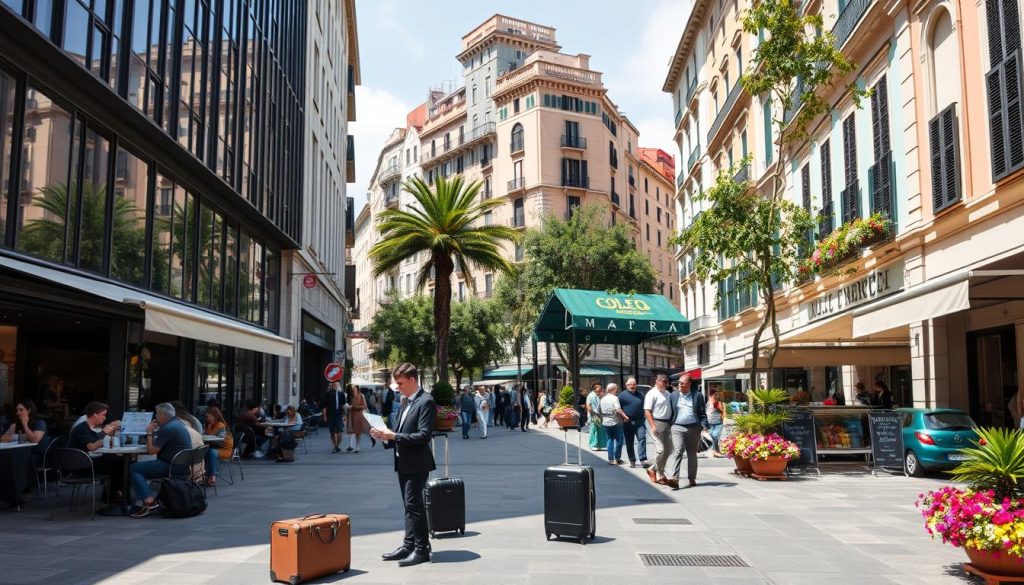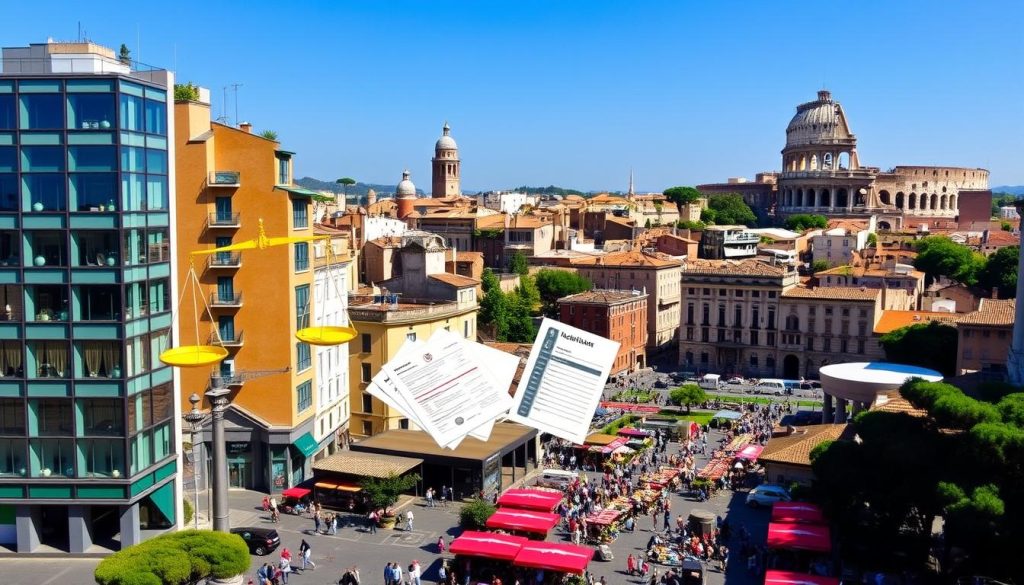The prospect of relocating to Italy for business presents a unique chance to engage with a dynamic culture while leveraging a thriving economy. As the trend of international relocation to Italy intensifies, numerous professionals are discovering the advantages this enchanting nation offers. Italy’s storied past and varied industries not only draw expatriates but also facilitate the establishment of new enterprises.
- Understanding the Business Landscape in Italy
- Relocating to Italy for Business: Key Considerations
- Essential Legal Requirements and Permits
- Business Opportunities in Italy: A Comprehensive Overview
- Setting Up Business in Italy: Steps and Challenges
- Finding the Right Location for Your Business
- Networking and Building Relationships in Italy
- Understanding Italian Business Culture and Etiquette
- Relocating Overseas for Job: What You Need to Know
- Cost of Living in Italy: Budgeting for Your Move
- Settling in: Expat Guide to Living in Italy
- Relocating Tips for Italy: Making a Smooth Transition
- International Relocation to Italy: What to Expect
- Tax Regulations for Businesses in Italy
- Adapting to Life in Italy: Language and Community Integration
This comprehensive guide aims to provide potential expatriates with vital information, encompassing the numerous opportunities, hurdles, and critical resources necessary for a seamless transition. Whether contemplating a startup or aiming to broaden your existing business, grasping the local environment is paramount for a well-informed choice.
Understanding the Business Landscape in Italy
Italy’s business environment is a complex tapestry of varied opportunities. To thrive within this setting, a deep understanding of the nation’s economic pillars is essential. Knowledge of these sectors aids expatriates in tailoring their entrepreneurial ventures to meet market needs, thereby boosting their chances of success.
Key Industries in Italy
The Italian economy is anchored by several critical industries, each playing a significant role in shaping the business landscape. These sectors are crucial for grasping the economic dynamics at play:
- Fashion – Italy is renowned for its luxury fashion, with brands like Gucci, Prada, and Armani leading the high-end retail market.
- Automotive – The automotive sector, home to Ferrari, Lamborghini, and Fiat, is a symbol of innovation and design excellence.
- Technology – Italy’s tech industry is rapidly evolving, with a focus on fintech, health tech, and software development, shaping the country’s digital future.
- Tourism – Italy’s cultural richness draws millions, offering substantial opportunities in hospitality and services.
Grasping the competitive dynamics within these industries is paramount. Economic reports and business surveys provide valuable insights into growth areas, enabling expatriates to make strategic decisions. Success in these sectors hinges on identifying trends and aligning with the market’s evolving demands.

Relocating to Italy for Business: Key Considerations
The decision to relocate to Italy for business ventures is laden with potential rewards, yet it necessitates a thorough examination of several critical factors. Grasping the nuances of cultural and economic landscapes is paramount, as these elements profoundly impact your professional journey. They dictate the fabric of daily interactions and serve as a cornerstone for devising successful business strategies.
Cultural and Economic Factors
Italy’s regional cultures present a tapestry of diversity, each with its own distinct customs and consumer inclinations. These regional variances can significantly influence your business operations. Hence, an understanding of local traditions is essential for cultivating robust relationships with clients and partners.
- Be aware of communication styles; Italians often value directness accompanied by warmth.
- Observe local dining etiquette when conducting meetings in restaurants.
- Adapt to different working hours which may vary between the north and south of Italy.
The economic terrain of Italy is equally significant. The country boasts a dynamic market, driven by sectors such as fashion, automotive, and technology. For those relocating overseas for job opportunities, grasping market demands is crucial for strategic product positioning.
Staying abreast of government policies and economic trends is equally imperative. Engaging with local business organisations can significantly enhance your market acumen, thereby mitigating potential challenges and facilitating a smoother transition into the Italian business environment.

Essential Legal Requirements and Permits
Embarking on a business relocation to Italy necessitates a thorough grasp of the legal frameworks governing residency and the requisite permits. The journey through these processes, though complex, is streamlined by knowledge of the necessary documentation. Each phase is pivotal for adherence to local statutes.
Visa and Residency Requirements
Securing the correct visa is paramount for establishing a business foothold in Italy. A variety of visas are available, each tailored to specific business endeavours, such as:
- Start-up Visa: Aids entrepreneurs in launching innovative start-ups.
- Business Visa: Ideal for individuals aiming to engage in business activities, encompassing investment or trade.
- Self-Employment Visa: Catered to those pursuing independent work or freelancing.
Post-securing a visa, the subsequent step is obtaining a residency permit. This permit allows foreigners to reside legally in Italy while overseeing their business operations. Furthermore, registration with local authorities is imperative, demonstrating compliance with local laws. Such registration facilitates the acquisition of critical legal prerequisites for business operation.
However, Italian bureaucracy can pose significant hurdles. Issues such as protracted processing times and region-specific requirements are common. Preparation and consultation with specialists on Italian business permits can greatly alleviate these challenges.

Business Opportunities in Italy: A Comprehensive Overview
Italy’s entrepreneurial landscape is dynamic, offering a plethora of business opportunities. The identification of emerging markets is crucial for those contemplating setting up business in Italy. As the economy undergoes transformation, several sectors are exhibiting substantial growth potential.
Emerging Markets and Trends
Investors and innovators are increasingly drawn to specific areas. The following trends highlight some of the most promising business opportunities in Italy:
- Sustainable Fashion: Italian craftsmanship, combined with eco-friendly practices, is revolutionising the fashion industry. Brands are now utilising organic materials and adopting ethical production methods.
- Digital Services: The digitalisation surge has created opportunities for businesses offering IT solutions, e-commerce platforms, and digital marketing services.
- Food and Beverage: Italy’s renowned culinary heritage offers a unique platform for organic and health-focused food entrepreneurs. This creates niche markets around traditional recipes.
- Tourism and Hospitality: With travel gradually returning to normal, investments in tourist experiences, sustainable accommodations, and local tours are expected to flourish.
Successful case studies demonstrate how international businesses have adapted and thrived in these markets. These examples serve as valuable guidance for potential entrepreneurs seeking to capitalise on Italy’s vibrant opportunities.

Setting Up Business in Italy: Steps and Challenges
The endeavour of establishing a business in Italy necessitates meticulous planning and a profound comprehension of the local market’s intricacies. For individuals relocating to initiate a business venture, the formulation of a robust business plan is paramount. This document not only delineates the enterprise’s vision and objectives but also evaluates the practicality of the concept within the Italian framework.
Creating a Business Plan
A detailed business plan encompasses several critical elements:
- Market Analysis: Conducting an in-depth examination of the target demographic, competitors, and prevailing market trends within Italy.
- Business Structure: Selecting the most appropriate legal entity, ranging from a sole proprietorship to a corporate structure.
- Financial Projections: Calculating initial investment costs, projected income, and the point at which the business will break even.
- Marketing Strategy: Crafting a promotional strategy to effectively engage with Italian consumers.
However, the journey does not end with the business plan. Entrepreneurs must also confront legal and financial hurdles. Grasping Italy’s tax regime, regulatory compliance, and employment laws is vital for success. Through diligent research and strategic foresight, those embarking on this venture can transform their ambitions into a financially viable enterprise.

Finding the Right Location for Your Business
The selection of an optimal location is paramount for achieving success. Italy’s varied regions present distinct advantages, necessitating a thorough examination of multiple factors for enterprise establishment. It is imperative to grasp the local market dynamics, economic prowess, and unique opportunities across different cities, as these elements profoundly impact decision-making.
Regional Insights and Considerations
Italy’s extensive array of regions, each with its economic emphasis and demographic characteristics, demands careful consideration. Below are pivotal insights for three prominent cities:
- Milan: Milan’s reputation in the fashion and finance sectors is unmatched, offering unparalleled access to business opportunities. Its dynamic networking environment positions it as an ideal locale for startups and established entities.
- Rome: As the capital, Rome’s political connections and tourism industry present significant advantages. The city’s cultural heritage continuously draws visitors, thereby benefiting businesses in hospitality and retail.
- Florence: Renowned for its artistic and craft heritage, Florence is a magnet for enterprises in design, fashion, and tourism. The city’s rich cultural tapestry offers unique marketing prospects.
In deliberating on the optimal location for your business, it is advisable to conduct exhaustive research on each region’s specific attributes. Engaging with local enterprises and communities can provide invaluable insights and foster beneficial partnerships.

Networking and Building Relationships in Italy
The establishment of a robust network is paramount for achieving success upon relocating to Italy for business purposes. The Italian culture’s emphasis on relationships underscores the significance of networking within any business endeavour. Engaging with local professionals not only fosters trust but also opens up a plethora of opportunities.
Business Networks and Connections
To excel in the Italian market, consider the following strategies for effective networking in Italy:
- Attend business fairs and expos: These events serve as excellent platforms for connecting with industry peers and potential clients.
- Join local associations: Becoming a member of chambers of commerce or professional organisations can greatly expand your network.
- Leverage social networks: Platforms like LinkedIn are invaluable for making connections and partaking in relevant discussions.
Personal connections often lead to collaborations and partnerships that can enhance your business. Many successful expatriates attribute their growth in Italy to the networks they developed during their initial periods. As you navigate through the intricacies of relocating to Italy for business, fostering relationships will be a significant asset.

Understanding Italian Business Culture and Etiquette
Embarking on a venture in Italy necessitates a profound comprehension of the prevailing customs and communication paradigms that underpin professional interactions. The emphasis on formal introductions and the cultivation of personal connections is paramount in Italian business etiquette. The establishment of relationships frequently relies on direct, face-to-face engagements, rather than solely on digital communication channels.
Navigating Communication Styles
The essence of effective communication in Italy is deeply embedded in its social fabric. It is customary to address colleagues with titles such as “Dottore” for medical professionals or “Ingegnere” for engineers, as a gesture of respect. Grasping these subtleties is crucial for expatriates, facilitating a smoother integration and the development of fruitful partnerships.
- Avoid discussing personal topics until a relationship has been established.
- Gesture and body language carry significant meaning, so maintain an open stance.
- Engage in discussions about culture, food, and art as they are valued topics.
Negotiation styles in Italy are characterised by a blend of accommodation and assertiveness. Anticipate a prolonged dialogue, where the cultivation of rapport precedes trust, culminating in successful agreements. Acknowledging the significance of understanding Italian business culture and integrating these practices will significantly enhance your experience within the Italian market.

Relocating Overseas for Job: What You Need to Know
The Italian job market, rich with opportunities, beckons those contemplating a move abroad for employment. Grasping the nuances of industry demands can markedly improve one’s prospects of landing a role. Growth sectors such as technology, healthcare, and tourism are particularly noteworthy. Acquainting oneself with these areas can direct job seekers towards the most promising opportunities.

Job Market Insights
Prospective employees will find a wealth of online resources and platforms dedicated to the Italian job landscape. LinkedIn, InfoJobs, and Monster stand out as invaluable tools. The importance of networking cannot be overstated, with local job fairs and professional associations serving as conduits to valuable connections. To differentiate oneself in the application process, consider the following:
- Customise your CV to reflect experience pertinent to the Italian job market.
- Appreciate the cultural subtleties that influence interview dynamics and expectations.
- Investigate potential employers to ensure your skills align with their requirements.
This expat guide to living in Italy extends beyond mere employment, offering a comprehensive view of daily life in Italy. It facilitates a smoother transition into this vibrant culture.
Cost of Living in Italy: Budgeting for Your Move
Grasping the financial landscape of Italy is paramount for a successful relocation. Each urban centre poses distinct fiscal hurdles and prospects. It is imperative to dissect expenses in realms such as housing, transportation, sustenance, and healthcare when formulating a budget for your transition. Such knowledge aids in a more seamless integration into Italian society.
Comparing Major Cities
The cost of living fluctuates markedly across Italy’s principal cities. Consider the following:
- Rome: Renowned for its historical allure, the capital exhibits elevated rental costs. A considerable portion of your financial allocation should be reserved for accommodation here.
- Milano: As Italy’s commercial epicentre, Milan boasts higher expenses, especially in affluent districts. Nonetheless, its employment opportunities might mitigate some financial burdens.
- Florence: With its stunning backdrop and profound cultural heritage, Florence’s living costs are generally lower than those in Rome and Milan. This makes it an attractive destination for many expatriates.
- Bologna: Famous for its dynamic atmosphere and exquisite gastronomy, Bologna strikes a balance between moderate living expenses and a vibrant community.
When examining the cost of living in Italy, it is vital to factor in potential savings. Strategies for cost management include patronising local markets, leveraging public transportation, and exploring neighbourhoods with potentially lower rental rates. A meticulously planned budget is indispensable for a seamless transition into Italian life.

Settling in: Expat Guide to Living in Italy
For newcomers, the process of settling in Italy is both thrilling and intimidating. Grasping the fundamentals of essential services and securing appropriate housing are pivotal for a seamless transition. This expat guide to living in Italy is designed to furnish you with the requisite resources and advice, facilitating your journey through the complexities of your new Italian life.
Essential Services and Housing
Securing access to vital services is paramount for your comfort and well-being as you settle in Italy. Below are a few critical services to consider:
- Healthcare: Register for the National Health Service (Servizio Sanitario Nazionale), which provides essential medical services for residents.
- Education: Identify local schools for your children, whether public or international, to ensure they receive the appropriate education.
- Utilities: Setting up utilities like water, electricity, and internet will help make your new residence comfortable quickly.
Securing the right housing is a crucial factor in your settling experience. Consider these tips for finding a home:
- Research neighbourhoods: Explore different areas to find the one that fits your lifestyle and budget.
- Determine rental options: Look at both short-term and long-term leasing options to find the best fit for your needs.
- Engage with local estate agents: They can provide insights into the market and assist you in finding suitable properties.
Furthermore, connecting with expat communities can offer invaluable support during your transition. Joining local groups enables you to meet others who understand the challenges of settling in Italy. Engaging with these communities will enhance your experience and help you create a social network in your new environment.

Relocating Tips for Italy: Making a Smooth Transition
Embarking on the journey of relocating to Italy necessitates meticulous preparation for a successful transition. The experience of adapting to a new country is a complex interplay of excitement and challenges. A profound understanding of Italian culture is crucial in simplifying the adaptation process to life in Italy.
Preparing for Cultural Adaptation
To optimise your experience in Italy, consider the following relocating tips for Italy focused on cultural adaptation:
- Engage in local activities, such as festivals and markets, to immerse yourself in the rich traditions.
- Learn the Italian language, as communication can foster connections with locals.
- Be proactive in social settings by joining groups or clubs that align with your interests.
- Understand regional customs, as practices can vary significantly across different parts of Italy.
- Approach challenges with an open mind and a positive attitude to ease the transition.

International Relocation to Italy: What to Expect
The journey of international relocation to Italy promises an exhilarating odyssey, replete with novel experiences and prospects. Upon arrival, several pragmatic steps and anticipations emerge, designed to facilitate your integration into this dynamic culture.
Initial Steps After Arrival
Upon settling in Italy, initiate by collecting indispensable documents such as your passport, visa, and any additional necessary paperwork. These documents are paramount for the subsequent tasks:
- Establishing a local bank account to manage your finances efficiently.
- Registering your residency at the local municipal office, a critical step for your legal presence.
- Acquiring a codice fiscale, akin to a tax identification number, essential for various transactions.
It is imperative to harbour realistic expectations as you adapt to your new surroundings. Culture shock can manifest in numerous ways, including language barriers and unfamiliar social norms. Be patient with yourself, allowing sufficient time to acclimatise to these transformations.
Grasp the subtleties of everyday life, such as local dining customs, shopping hours, and transport systems. Engaging with local expat communities can offer invaluable support and insights, aiding in your navigation of your new life in Italy.

Tax Regulations for Businesses in Italy
For those contemplating the establishment of a business in Italy, a comprehensive understanding of the tax regulations is imperative. The tax environment, though intricate, can be navigated with knowledge of corporate taxation rates, VAT compliance, and local taxation. Such familiarity significantly simplifies the process.
Compliance and Planning
Italy’s corporate tax rate stands at 24%, applicable to the majority of companies’ profits. Additionally, Value Added Tax (VAT) is set at 22%, with certain goods and services benefiting from reduced rates. Adherence to these rates is critical to circumvent penalties and ensure operational success.
Strategic tax planning can also offer advantages. Businesses may be eligible for tax exemptions or incentives, particularly when investing in specific regions or sectors. Collaborating with a local tax advisor is advisable to exploit these opportunities, thereby maximising potential benefits.
Moreover, local taxes such as the Municipal Tax (IMU) on property and regional taxes play a significant role in financial planning. Acquaintance with these additional tax obligations is essential for effective expense management.

- Standard corporate tax rate: 24%
- Value Added Tax (VAT): 22%
- Potential exemptions for new businesses
- Local taxes: IMU and regional taxes
In conclusion, a deep understanding of Italy’s tax regulations, coupled with proactive planning, is fundamental to the establishment of a successful business. This knowledge and approach are essential as you navigate the process of setting up a business in Italy.
Adapting to Life in Italy: Language and Community Integration
The process of adapting to life in Italy transcends mere relocation; it necessitates an earnest commitment to cultural and communal engagement. Language integration emerges as a pivotal strategy, as proficiency in the local tongue signifies a profound respect for and a genuine desire to immerse oneself within the dynamic Italian milieu. Prior to and post-relocation, consider investing in language classes or leveraging the efficacy of popular language learning applications to establish a foundational understanding.
Joining Local Communities
Active participation in communal events is a crucial step towards achieving a sense of belonging in Italy. Towns and cities frequently host festivals, markets, and workshops that celebrate local customs. By engaging with these events, one can forge connections with residents and cultivate vital social bonds. Furthermore, joining clubs or groups aligned with personal interests can facilitate the formation of friendships and the establishment of a support network, essential for a seamless adaptation to Italian life.
Volunteering stands as an exemplary method to contribute to the community while gaining a deeper appreciation for Italian culture. Whether through involvement in local charities or environmental projects, such activities can foster meaningful relationships, thereby enhancing one’s sense of belonging. Embracing language integration and community engagement will undoubtedly enrich your experience, ensuring a smoother transition into the Italian way of life.

